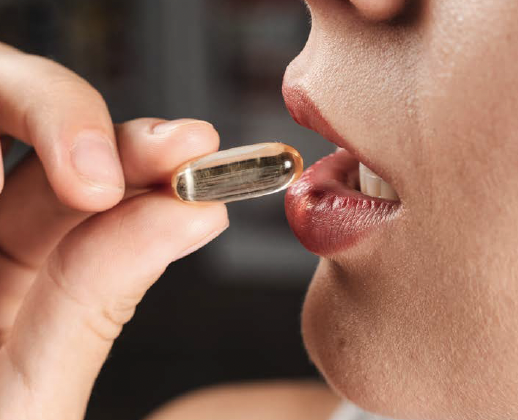The relationship between the skin microbiome and gut microbiota is a major topic in integrative health.
Dr Olivier Grall and Dr Jean-François Bezot
These two ecosystems, though separate, work closely together thanks to biological mediators such as short-chain fatty acids (SCFA), hormones and micronutrients. This dynamic influences both skin health and the body’s overall equilibrium.

Key interactions for skin health
The gut microbiota produces metabolites that act directly upon the skin. Among them, the SCFA, such as butyrate or propionate, play an essential role:
• Anti-inflammatory: They reduce the inflammation responsible for pathologies such as acne, rosacea and psoriasis.
• Strengthen the skin barrier: They stimulate ceramide synthesis, which is essential for hydrating and protecting the skin.
• Immune regulation: By adjusting the regulating T cells, they improve the skin’s immune tolerance.
What is more, the hormones produced or adjusted by the gut microbiota, such as cortisol or oestrogen, directly influence the condition of the skin. For example, a hormonal imbalance can aggravate issues such as eczema or acne. Finally, essential micronutrients like biotin (vitamin B7) or vitamin D, which are regulated by the microbiota, play an active role in skin health.
Aiming for global care
To reset the balance between the skin and gut microbiome, we need to adopt an integrative approach in light of the expertise needed to analyse the microbiota (biopredix.com).
1. Adjusting the gut microbiota
• Diet: Prebiotic fibres, polyphenols (red berries, cacao) and omega 3s help boost SCFA production and reduce inflammation.
• Targeted Probiotics: Specific strains such as Lactobacillus rhamnosus or Clostridium butyricum promote intestinal health and improve hydration and skin balance.
2. Supporting the skin microbiome
• Use gentle products and topical formulations containing probiotics to restore the skin flora.
3. Managing hormone imbalances and deficiencies
• Reduce stress with practices such as yoga or meditation to reduce the impact of cortisol.
• Take vitamin D or zinc supplements in the case of deficiencies or infra-clinical deficiencies (biopredix.com), in order to boost immunity and sebum regulation.
Responding to specific dermatological issues
• Acne: Diet with a low glycaemic index, zinc and probiotics.
• Eczema: Support the skin barrier with ceramides and specific probiotic strains (Lactobacillus rhamnosus GG).
• Rosacea: Reduce pro-inflammatory foods and take anti-inflammatory probiotics.
The importance of a personalised approach
The gut-skin axis is a dynamic system influenced by many factors. By acting simultaneously upon the gut and skin microbiota with diet, topical products and stress management, we can prevent or improve a number of dermatological issues. Adopting an integrative and personalised approach not only allows us to treat any existing imbalances but also to boost the patient’s overall health and wellbeing. It is a promising path for the future of dermatology and functional medicine. Treatments that affect the microbiota are included in P4 Medicine(c) (Personalised, Predictive, Preventative and Participative), the famous international brand of medicine that helps people live longer in a state of good health and wellbeing.
Furthermore, the M588 strain of C. butyricum, also known as MIYAIRI 588 (CBM 588) is known for its ability to produce butyric acid, a short-chain fatty acid that is essential to colon health and has anti-inflammatory properties. These properties could potentially be beneficial in the context of inflammatory diseases, including some skin issues.
Dr Olivier Grall

Graduated from Brest medical faculty. Graduated from the CIME (International College of Aesthetic Medicine). Microbiota specialist for over 10 years. Practice in Le Relecq-Kerhuon, near Brest.
Dr Jean-François Bezot

Doctor of anti-aging and aesthetic medicine. Graduate of the Rouen medical faculty. Has specialised in preventative and performance medicine since 1997. Permanent member of the French Society of Aesthetic Medicine.
More: biopredix.com













